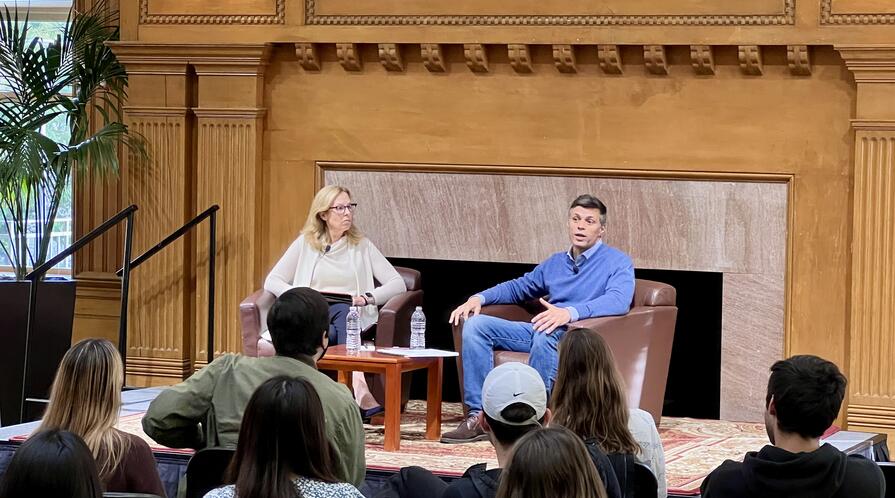Statement on the Abduction of Summer Fellows Alum Jesús Armas (2022, Venezuela)
The faculty and staff of Stanford's Center on Democracy, Development and the Rule of Law (CDDRL), as well as the undersigned alumni of the Fisher Family Summer Fellows Program (FFSF, formerly known as the Draper Hills Summer Fellows Program, DHSF), demand the immediate and safe release of our friend and colleague, Jesús Armas, who has been kidnapped by agents of the Venezuelan government.
Jesús has bravely worked with the opposition to promote fair elections and uphold democracy in Venezuela. His abduction is a blatant act of repression aimed at silencing his vital work for freedom and justice.
We call on the Venezuelan government to release Jesús immediately and urge the international community to condemn this attack on democracy and human rights. Jesús inspires us all, and we stand united in solidarity with him and his fight for a brighter future for Venezuela.
Signed,
Tatevik Matinyan, Armenia (DHSF 2022)
Daria Minsky, Belarus (DHSF 2022)
Mariana Mello, Brazil (DHSF 2022)
Tainah Pereira, Brazil (DHSF 2022)
Assefa Getaneh, Ethiopia (DHSF 2022)
Zurab Sanikidze, Georgia (DHSF 2022)
Gabriel Reyes Silva, Guatemala (DHSF 2022)
Ritu Sain, India (DHSF 2022)
Aida Aidarkulova, Kazakhstan (DHSF 2022)
Carol Kiangura, Kenya (DHSF 2022)
Jacqueline Akinyi Okeyo Manani, Kenya (DHSF 2022)
Ainura Usupbekova, Kyrgyz Republic (DHSF 2022)
Alaa Al Sayegh, Lebanon (DHSF 2022)
Jad Maalouf, Lebanon (DHSF 2022)
Natasha E. Feghali, Lebanon (DHSF 2022)
Mariela Saldivar Villalobos, Mexico (DHSF 2022)
Bulgantuya Khurelbaatar, Mongolia (DHSF 2022)
Sarita Pariyar, Nepal (DHSF 2022)
Dr. Babatunde Omilola, Nigeria (DHSF 2022)
Daniel Alfaro, Peru (DHSF 2022)
Andréa Ngombet, Republic of Congo (DHSF 2022)
Jamus Lim, Singapore (DHSF 2022)
Anchal Baniparsadh, South Africa (DHSF 2022)
Geline Alfred Fuko, Tanzania (DHSF 2022)
Ornella Moderan, Togo (DHSF 2022)
Denis Gutenko, Ukraine (DHSF 2022)
Nariman Ustaiev, Ukraine (DHSF 2022)
Yulia Bezvershenko, Ukraine (DHSF 2022)
Rayhan Asat, Uyghur human rights lawyer / USA (DHSF 2022)
Tien Trung Nguyen, Vietnam (DHSF 2022)
Brett Carter, Assistant Professor, University of Southern California; Hoover Fellow, Stanford University; Affiliate, CDDRL, Stanford University, USA
Biljana Spasovska, Executive Director, BCSDN, North Macedonia (FFSF 2024)
Sunny Cheung, Hong Kong (FFSF 2023)
Hector Fuentes, Visiting Scholar at CDDRL, Venezuela (FFSF 2024)
Erik Jensen, Affiliated Faculty, CDDRL, USA
Khatia, Former member of the Parliament, Georgia (FFSF 2024)
Mykhailo Pavliuk, Chernivtsi Oblast Legislature, Ukraine (FFSF 2023)
Alice Siu, Deliberative Democracy Lab, USA
María Ignacia Curiel, Researcher at Poverty, Violence and Governance Lab, CDDRL, Stanford, USA
Thao Dinh, Coordinator of Civil Society Forum, Vietnam (FFSF 2024)
Tem Fuh, Project Manager, Institute for Security Studies, Kenya (FFSF 2023)
Dagva, Open Society Forum, Mongolia (FFSF 2024)
Margaret Levi, Senior Fellow, CDDRL, USA
Halyna Yanchenko, Member of Parliament of Ukraine, Ukraine (FFSF 2023)
Iaroslav Liubchenko, Head of the Department on Building Integrity in The Defence and Security Sector at the National Agency on Corruption Prevention, Ukraine (FFSF 2023)
Nora Sulots, Communications Manager, CDDRL, USA
Cristofer Correia, Voluntad Popular, Venezuela (FFSF 2023)
Stephen Stedman, Senior Fellow, CDDRL, Stanford, USA
Sally Abi Khalll, Oxfam, Lebanon (FFSF 2023)
Ivetta Sergeeva, Postdoctoral Fellow, CDDRL, Russia
Valentin Bolotnyy, Kleinheinz Fellow, Hoover Institution, USA
Gulsanna Mamediieva, Georgetown University, USA (FFSF 2023)
Tamar Khulordava, Former MP, founder of Egeria Solutions, Georgia (FFSF 2023)
Francis Fukuyama, Olivier Nomellini Senior Fellow, Freeman Spogli Institute for International Studies, and Director, Ford Dorsey Masters in International Policy, Stanford, USA
Betilde Muñoz-Pogossian, Director of Social Inclusion at the Organization of American States, USA (DHSF 2021)
Sophie Richardson, Visiting Scholar, CDDRL, Stanford University, USA
Diego Zambrano, Professor of Law, Stanford Law School, USA/Venezuela
Beatriz Magaloni, Graham H. Stuart Professor, Political Science and Senior Fellow, FSI, Stanford University, USA and Mexico
Didi Kuo, Center Fellow, CDDRL, USA
Dinsha Mistree, Affiliated Researcher, CDDRL; Research Fellow, Hoover Institution, USA
Evan Mawarire, Senior Fellow, USA (DHSF 2018)
Raihana Maqbool, Independent Journalist, India (DHSF 2021)
Alon Tal, Visiting Professor, USA/Israel
Nikita Makarenko, Independent Journalist, Uzbekistan (DHSF 2021)
Ghina Bou Chakra, Amnesty International, Lebanon (FFSF 2023)
Alberto Díaz Cayeros, Senior Fellow, CDDRL, Stanford University, USA / Mexico
Aisha Yesufu, Citizens Hub, Nigeria (DHSF 2021)
Gillian Slee, Gerhard Casper Fellow in Rule of Law, CDDRL, USA
Victor Spinu, Parliament of the Republic of Moldova, Republic of Moldova (FFSF 2024)
Denis Gutenko, AirLittoral Cofounder, Ukraine (DHSF 2022)
Ali Carkoglu, Political Scientist, CDDRL Visiting Scholar, USA
Jamie O'Connell, Lecturer in Residence, Stanford Law School and Affiliated Scholar, CDDRL, USA
Ruben Mascarenhas, National Joint Secretary, Aam Aadmi Party, India (FFSF 2023)
Kumi Naidoo, Payne Distinguished Lecturer, 2023-25, USA / South Africa
Mary-Therese Heintzkill, Program Manager, CDDRL, USA
James Fearon, Professor, Stanford University, USA
Kim Juárez Jensen, Poverty, Violence, and Governance Lab, USA
Larry Diamond, Senior Fellow, Center on Democracy, Development and the Rule of Law, Stanford University, USA
Manasi Subramaniam, India (FFSF 2023)

We are concerned and outraged to learn of the state-sponsored abduction of 2022 Fisher Family Summer Fellow Jesús Armas by agents of the Maduro regime in Venezuela. We urge the regime to release him from detention immediately.
























